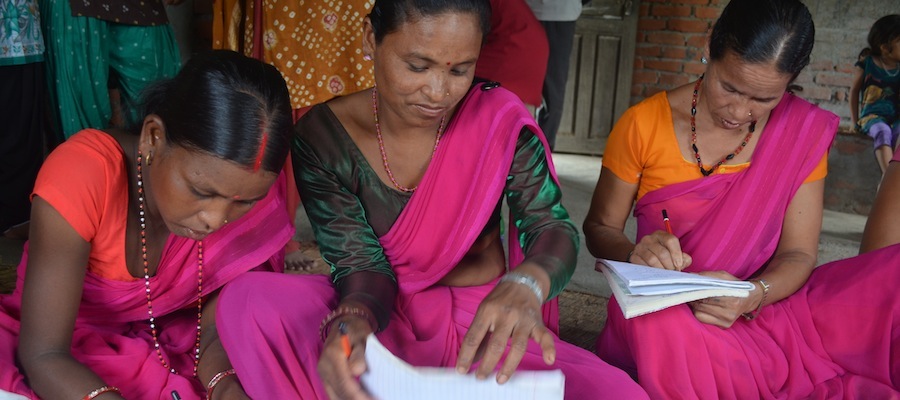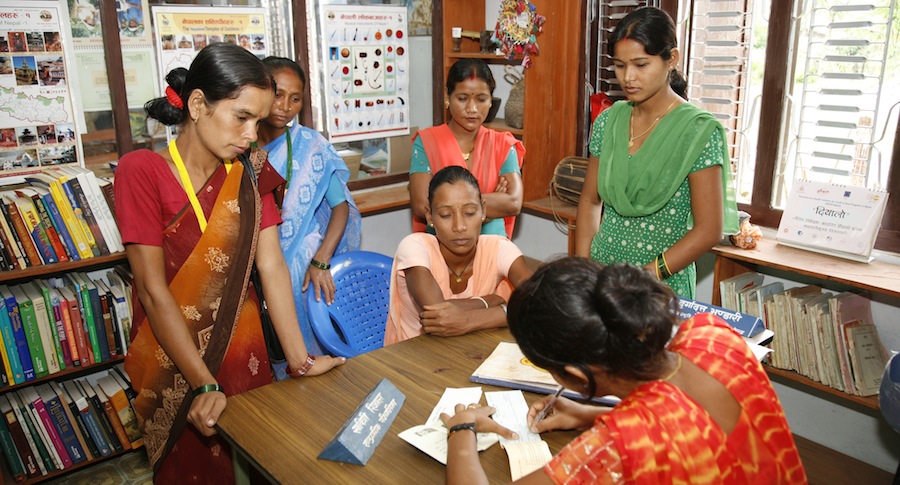
This article was featured in The Christian Science Monitor, and originally appeared at Global Envision, a blog published by Mercy Corps.
“Being born a girl is worthless,” said Chuna Devi, a Nepalese woman. Because her family didn’t think her education was a priority, she grew up illiterate, herding goats and cows.
Women make up just 24 percent of the formal workforce in South Asia, according to the Wall Street Journal. That represents a huge untapped resource: 336 million women like Chuna could be contributing to their families’ incomes and lifting themselves out of poverty if they had the skills to do so.
Chuna is part of a solution to inequity and poverty that is taking root in some of South Asia’s most remote corners, and it begins with a simple but disruptive idea: going to the library.
For more than 2 million rural villagers across South Asia, libraries called “READ Centers” have already become a powerful platform for women like Chuna to learn skills, network in her community, and become leaders who change social norms.
At the age of 47, Chuna changed her and her daughters’ lives by learning to read and starting a women’s group. Today, her goal is to convince other women that it’s never too late to learn, earn an income, and change your community.
Watch a three-minute video of Chuna’s story:
Women play a vital role in poor households. As UN Secretary-General Ban Ki-moon put it recently, “Empowering rural women is crucial for ending hunger and poverty. By denying women rights and opportunities, we deny their children and societies a better future.”
A recent UN study shows that if women were given the same access to productive resources as men, it would reduce the number of hungry people in the world by about 12 to 17 percent. Similarly, USAID stated that women are more likely than men to reinvest in their families’ food security, health, and education (see the infographic here).
Despite the obvious benefits, the road to entrepreneurship is extremely difficult for many women. They often lack the education and skills needed, and face gender discrimination. About 493 million women are illiterate worldwide, more than half of whom live in South Asia.
These women rarely have the opportunity to learn at a young age. 130 million girls in South Asia will be married as children by 2030, ending their education and resulting in early pregnancies. As adults, these women often must seek permission from their husbands to leave their homes for reasons other than child care or agricultural work.
In South Asia, libraries are seen as legitimate, neutral places for women to visit because they often offer child care and health services that benefit the family. The READ Centers set up by the non-profit READ Global also help women learn income-producing activities, such as sewing, beekeeping, or mushroom farming.
When women learn a trade and start providing income to their families, their husbands often gain trust in the READ Center and give them more freedom. Women can become networked with a community of other women who provide mutual, ongoing support.
Literacy does not necessarily precede economic empowerment. But READ Global has found that these skill sets are mutually reinforcing, and together, they can empower women to change the status quo in their villages.
Just last year, more than 1,700 women like Chuna learned to read through READ Centers in Nepal. Many of them also joined savings cooperatives, often putting away money for the first time in their lives. With 3,339 peers, the women collectively saved $207,382 last year at READ Centers.

And many finally became entrepreneurs: 324 moved from subsistence farming to commercial farming – earning an income from agriculture for the first time. 174 women farmers actually became self-sufficient in their production for the first time, and almost 100 women launched new businesses.
With this new income, the women helped generate almost $140,000 to invest back into the READ Centers and sustain them.
A major challenge in rural development is that efforts often don’t take a holistic approach. Many organizations and government bodies work in a piecemeal fashion: They provide one-off literacy training to women in a community for a few months, for example, and then move on.
The women will have taken a huge first step in self-empowerment by learning to read, but they won’t necessarily have the resources or the support network to apply or build on their new skill.
For women like Chuna, libraries like READ Centers can play the role of incubators – not just for businesses, but also for long-term social change. By working with local partners, setting up committees to manage the centers, and providing a holistic set of training programs over the course of five years, READ Global ensures that rural villagers create local support networks that can sustain themselves in the future.
After Chuna learned to read, she had the confidence to take other training in vegetable farming, women’s leadership, health, and mobile technology. She then paid it forward by convincing her friends to join a study group with her, helping them learn to read and investing in her own daughters’ education.
“I realized that all uneducated women suffer,” Chuna says, “There are a lot of illiterate women in Nepal. I want to tell them that you’re never too old to learn.”
About the author:

Sara Litke, READ Global Senior Program Officer
As READ Global’s Senior Program Officer, Sara manages the organization’s monitoring activities and oversees program evaluation efforts, as well as its marketing and communications strategy. She also supports institutional fundraising and grant writing, as well as new program initiatives and strategy for the global office. Sara also coordinates across all country offices to support the build out of sustaining enterprises. She joined the READ team in 2011 after two years of service as a Peace Corps volunteer in rural Mali, West Africa, where she worked with local villages in natural resource management and health.




